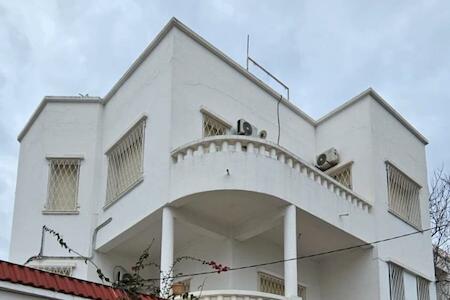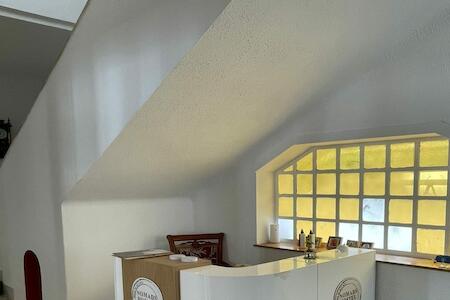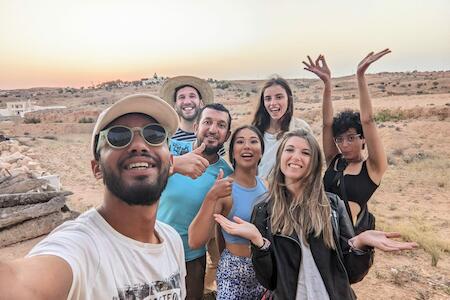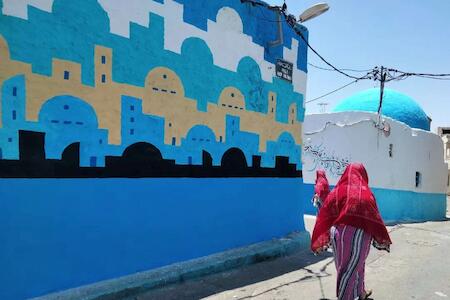Bizerte is a very beautiful city -- I like it, especially the beach. I advise others to make a visit to it.
Hostels in Tunisia 
Looking for the best hostels in Tunisia? You are in the right place!
On this page, we have listed every city in Tunisia with backpacker hostels and budget-friendly stays. Hostelz.com makes it easy to find your ideal Tunisia hostel by comparing prices across major booking platforms. Save money while backpacking Tunisia and sleep comfortably on a budget.
All Backpacker Hostels in Tunisia
We have got you covered with a complete list of every hostel in Tunisia, across 9 cities! Not all cities have hostels, but many offer alternative budget options like guesthouses and affordable hotels. Use our filters to quickly find cities with hostels or other budget accommodations to simplify your trip planning.
All Tunisia hostels on a map
Alright, you are more the visual type? Planning your trip with a map is always handy.
Therefore, this map shows you all cities with hostels in Tunisia. It will help you to plan your trip. Just zoom in the map and click your destination for more details. Just so you know: If we do not have a hostel in a city, it is likely that there is no hostel in that city.
Our handwritten guide on Backpacking Tunisia
Tunisia is a country on the north coast of Africa. Cape Angela is the northernmost point on the African continent. Tunisia is bordered by Algeria, Libya, and the Mediterranean Sea. The capital of Tunisia is Tunis, which is also its largest city. Other cities in Tunisia include Sfax, Djerba, and Sousse.
The international airport in Tunisia is Tunis-Carthage International Airport. It is possible to explore the country without your own transportation - go by regional bus to most tourist sites, towns, and more. If you need a car or driver for a day, hire one inexpensively.
The currency in Tunisia is the Tunisian dinar. The main economies are agriculture, mining, petroleum, and manufacturing, and those are mostly exported. There is a high percentage of unemployment. In 2011, Tunisia revolted against a lack of political freedom and labour unions; the revolution in Tunisia set off the Arab Spring, a series of revolts in much of Northern Africa. Tunisia is once again stable and generally safe for travellers, although you should take precautions and be respectful of any laws and customs.
Humans have inhabited Tunisia since prehistoric times; today’s Berber Tunisians are descendants of the agricultural tribes that settled here. The coast was settled as early as the 12th century BCE whilst powerful Carthage was founded around the 9th century BCE by Phoenicians. By the 5th century BCE, Carthage was the predominant civilsation in the Western Mediterranean.
In the 2nd century BCE, Carthage was finally conquered by the Romans. There are some beautifully preserved Roman ruins in Tunisia; the amphitheatre in El Djem (3rd century AD) is one such masterpiece. In the late 7th century AD, Arab Muslims conquered Tunisia and began to build exceptional mosques. The Grand Mosque at Kairouan is the oldest mosque in the Maghreb, built in approximately the 9th century AD although the original building dates to much earlier.
By the 16th century, the coast was held by pirates while inland was controlled by the Ottomans and later the French. It was occupied by the Nazis in World War II and governed via France by the pro-Nazi Vichy party. Tunisia was granted independence from France in 1956. Today’s Tunisia is vibrant - a modern Arab capital - although some governments are warning their citizens away. Please check any travel warnings before planning a trip.
The climate in Tunisia is Mediterranean in the north, with mild rainy winters and hot, dry summers. The south of the country is a desert climate. The Atlas Mountains cross the country in the northeast, from Algeria to the Cape Bon peninsula. The remaining geography gives way to a hot central plain and culminates in the Sahara desert. A series of salt lakes cross the northern border of the Sahara desert.
Budget accommodation in Tunisia can be found in Tunis, Sfax, Djerba, Sousse, and other towns. Traditional European-style hostels are rare to nonexistent, however. You will find a lot of resorts, as Tunisia is a popular holiday destination for Europeans, but it is possible to find budget accommodation. Instead of the backpacker hostel, consider a guesthouse or inn.
After you have your accommodation arranged, here are some recommendations on what to see while in Tunisia. In the main city of Tunis, do not miss the many mosques (interiors are off-limits to foreigners at the many working mosques.) The Roman ruins at Carthage provide hours of exploration. Visit the seaside Antonine baths, the amphitheatre, the Magon quarter, and the villas. Next, wander the eerie Sanctuary of Tophet, where its believed children were sacrificed to Baal; archaeologists uncovered thousands of urns containing the ashes of young children. Travellers keen to see more Roman ruins can visit Dougga and El Djem.
Further south, the Berber tribal culture is evident in Douz and Tataouine, where you can see the granaries, ride camels, and explore the Jebil National Park. The history of Tunisia is strong and the culture is rich; explore slowly and let the warm Tunisian hospitality envelop you.
Handwritten by local expert for Tunisia hostels Jakob Lombardi
Travel Tips for Tunisia - from the Community
Hey fam! Here are a few more tips from the community, from them to you, and you to them. This space is dedicated for travellers to share their best tips on backpacking Tunisia. Have a closer look - the Hostelz community share real hidden gems, insider knowledge and overall impressions of Tunisia. Everyone is welcome to add something useful, funny, unexpected and the "absolutely necessary to know before you go" - share, share and then share a little more!
FAQ on Hostels in Tunisia
There is a lot of travel planning to do. So let us help you once again by putting together the frequently asked questions:
Finding Hostels and Prices
What hostel booking sites are best to use?
There is several hostel booking sites, such as Hostelworld.com, Hostelsclub.com and Booking.com. While every platform has its pros and cons, there is a universal truth you as a traveler should be aware of: Not a single booking site can always offer the best prices.
This is where Hostelz.com comes in. You can compare all major booking portals with one click.
For you as a traveler, Hostelz.com is the best booking site to actually save money.
How much are hostels in Tunisia?
Prices always vary, depending on various factors. Weekends tend to be more expensive, same goes for special holidays. Please also take into account local vaction time.
You can search for exacty hostel prices in Tunisia here on Hostelz.com. Pick your destination and pick a date. The system will track down the prices to give an idea of what budget and prices you can expect.
When to book hostels?
If you want to stay at the best hostels, it is a good idea to have your hostel booked around 1 month before you travel. For the regular hostels, booking one week before should be okay. Yet again, this always depends.
We dedicated a full article to the topic of when to book hostels.
Safety and Packing
Are hostels in Tunisia safe?
Generally speaking, hostels are as safe as you make them. We highly recommend always to bring your own padlock, using the lockers and taking care of your belongings. Make sure you pick a safe hostel, offering lockers and a safe location. Please always pay attention to the reviews; they can give you a great insight on what to expect and safety tips.
What to pack when staying in hostels?
There is a few basics you should always pack when staying in hostels.
There is more actually. We wrote a complete guide with more details. Read our full hostel packing list.




